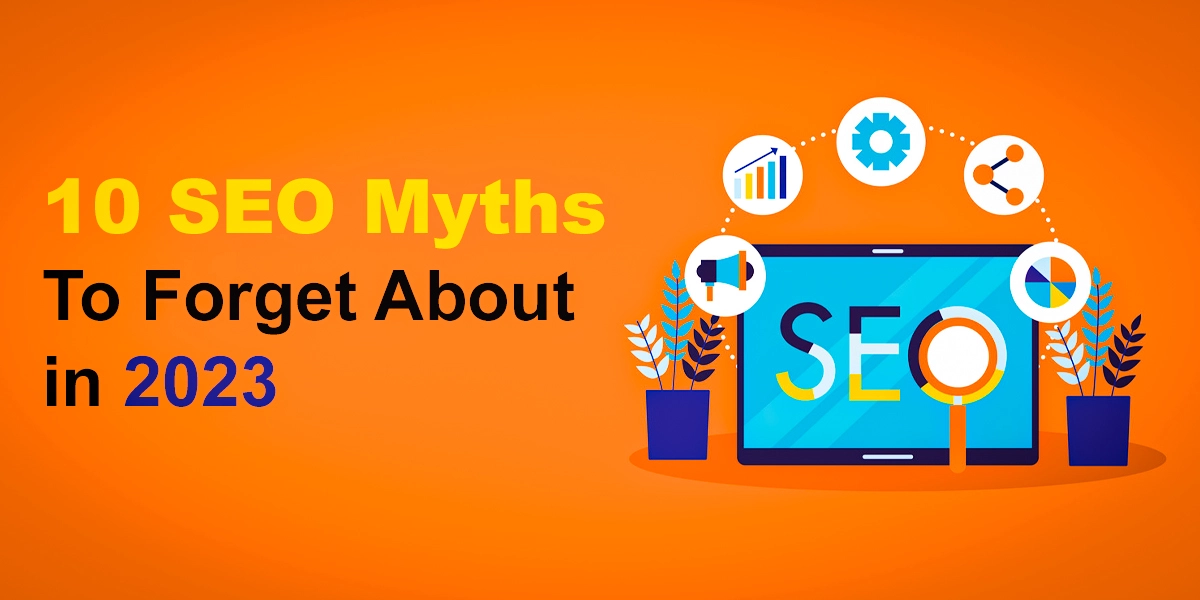Top 10 SEO Myths To Forget About in 2023
Search Engine Optimization (SEO) is a constantly evolving field, and what worked in the past may not hold true today. As we head into 2023, it’s essential to separate fact from fiction and debunk some common SEO myths. By letting go of these misconceptions, digital marketers can adopt effective strategies that will help their websites rank higher on search engine result pages (SERPs).
In this blog post, we’ll debunk ten SEO myths that you need to forget about in 2023.
Debunking 10 SEO Myths To Propel Your Website's Success in 2023

Myth 1: Keyword density is important for SEO.
Gone are the days when keyword density played an important role in SEO. While it’s necessary to use relevant keywords in your content, Google’s algorithm has grown to prioritise high-quality, user-focused content. Focus on creating engaging, informative content rather than stuff-sitting keywords.
Myth 2: SEO is a one-time mission.
SEO is a continuous strategy. Optimising your website for search engines needs endless effort to keep up with algorithm updates, competitor analysis, and evolving industry trends. Regularly updating your content, monitoring analytics, and adapting your strategy are all important for long-term success.
Myth 3: Meta tags do not affect SEO.
While meta tags alone may not directly impact rankings, they play a vital role in improving click-through rates (CTRs). Well-crafted meta tags, including title tags and meta descriptions, can attract users to click on your website’s link in the SERPs, ultimately boosting organic traffic.
Myth 4: SEO is all about ranking first on Google.
While ranking high on SERPs is desirable, it’s not the sole focus of SEO. The immediate goal is to drive organic traffic and generate relevant leads. Even if you’re not in the top position, a well-optimized website can attract valuable visitors who are more likely to convert.
Myth 5: Social media signals directly result in SEO.
While social media presence can indirectly contribute to SEO, social signals themselves (likes, shares, etc.) do not have an immediate impact on search engine rankings. However, social media platforms can help drive traffic to your website and enhance your online visibility, indirectly influencing SEO.
Myth 6: Paid ads improve organic search rankings.
Pay-per-click (PPC) ads have no direct impact on organic search rankings. Google maintains a clear difference between paid and organic results. However, paid ads can enhance your overall online visibility and increase brand awareness, indirectly benefiting your SEO efforts.
Myth 7: More indexed pages lead to higher rankings.
It’s an ordinary misunderstanding that having a higher number of indexed pages automatically improves your website’s rankings. While having valuable, relevant content can positively impact SEO, it’s crucial to prioritize quality over quantity. Focus on creating valuable, well-structured pages that address user needs.
Myth 8: SEO is all about technical optimization.
While technical optimization is essential, SEO encompasses a broader range of factors. User experience, content quality, mobile-friendliness, backlink profile, and website speed are equally crucial. A holistic approach that addresses multiple aspects of SEO is essential for success.
Myth 9: Link building is no longer an applicable intent.
Link building remains a crucial element of SEO. However, the emphasis has shifted from quantity to quality. Building authoritative, relevant backlinks from respected websites is important. Natural, organic link-building through high-quality content and relationship-building is still beneficial.
Myth 10: SEO promises fast results.
SEO is a long-term effects goals method that requires patience and persistence. It takes time for search engines to crawl, index, and rank your website. Overnight results are unrealistic. Consistent activity, data analysis, and adaptation are key to achieving sustainability.
Conclusion
As we enter 2023, it’s crucial for digital marketers to let go of outdated SEO myths and adopt strategies based on current best practices instead. By understanding these truths about modern SEO techniques, you can position your website for success in an ever-competitive digital landscape.
Remember—SEO is an ongoing process that requires adaptability and staying up-to-date with industry trends! Contact with TechMozo—an industry digital marketing company in Delhi committed to providing cutting-edge digital marketing solutions—to leverage your website’s true potential in this ever-evolving digital landscape.
